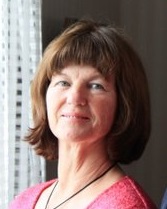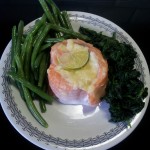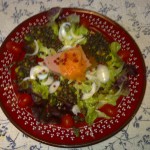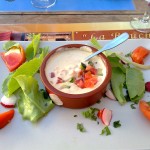Dr Schnittger graduated from the Royal Karolinska Medical- Chirurgical Institut in Stockholm in 1973 and received her specialist certificate of Obstetrics and Gynaecology in 1978. She completed her Ph.D. in 1983 with the thesis » Alpha fetoproteine in obstetrical practice »and continued to publish further articles on Obstetrics. She founded the private clinic » Karolinakliniken » in Linköping, specialising in infertility study and treatment, during the 1980’s and 90’s. She is a former member of « The Royal Society of Medicine », UK, and had a partnership at the Scandinavian Medical Centre, Harley Street, in the 1990’s. After moving to France, she continued her private surgery in L’Isle sur la Sorgue, Vaucluse, for a further 6 years – helping patients with gynaecological problems and prenatal surveys. Dr Schnittger graduated from the University of Montpellier in Nutrition and Therapeutic Diet in 2011 and achieved a diploma in Diabetology in 2012. She is currently a member of the « Fédération Française de Massage Relaxante Traditionnel, FFMRT.
Why Change my lifestyle?
1. I turn 45 years old soon and I’m worried about aging. I have put on some weight during the last 15 years and lost my youth fulness.
2. I often feel tired and have difficulties climbing stairs. If I can find a lift or escalator, I certainly use it. Normally, I choose the parking space closest to the entrance of the shop. I don’t like standing in long queues.
3. I have backache and painful joints. I suffer from water retention in the heat or during menstruation.
4. My Menstrual cycle has become irregular and I feel irritated and moody at certain times of the month. This causes problems at home and I easily quarrel with my family.
5. I suffer from a bloated abdomen and struggle with simple tasks like tying my shoelaces.
6. I have a low libido and have lost intimacy with my partner.
7. I don’t sleep very well any more. I often wake during the night, suffering from anxiety, hot flushes and stomach ache.
8. Although I know I shouldn’t, I sometimes skip meals and often miss breakfast. During my day I find that there isn’t enough time for a regular lunch and I eat on the run. In the evenings, when I get home from work, I am too tired to cook. I often feel hungry during the day and often snack between meals.
9. Before we had kids, I used to do many different sports, several times a week. Now, I find it very difficult to fit in any exercise.
10. I haven’t seen my GP for a check-up for a long time. I worry that I might suffer from ailments such as hypertension, lack of iron and vitamins or perhaps I have diabetes like my mother – or even worse – cancer. I should make an appointment to see my doctor!Why should I start now?
If you experience some of the problems above, you could act now to avoid future health problems. You are in the middle of your life so it’s not too late to change your lifestyle and stay healthy for the rest of your life.
Why visit Mas Rabassan?
When you stay in your usual surroundings, life goes on as it always has with all the usual distractions. It’s difficult to find the time to reflect, to collect information and to be inspired by the new ideas that will lead to a change in your life.
What kind of challenges are you up against?
1. It is not enough to be aware of the fact that there is something wrong.
2. You have to recognise the importance of your condition to make a decision.
3. You have to find out how to use the tools available to make the change come about.
4. And you have to have realistic goals!
Why is it so difficult to change your lifestyle all by yourself?
We are all part of a family, a community of friends, colleagues and neighbours. We are affected by society, our country, the culture which we belong to and all the advertising and attitudes of our surroundings. We have a time-schedule at work, fixed family relations, customs we adhere to, all in place since our childhood. We have different priorities and our economical situation differs. All these factors affect us in different ways.
What can we do at Mas Rabassan to help you?
We welcome you to the Mas for a week or a long weekend, relaxing, finding peace close to nature. You will be able to stroll around the vineyards and oak forests, but also visit many interesting, colourful villages and wonderful nature sites.
To achieve your project of « changing life style », we recommend four seminars during a week stay or three seminars over a weekend; interactive, tailored nutrition, different menus, therapeutic regimes, eating behaviours, how to set goals and how to get there, and then follow up.
A study, which was designed to compare the effect of different diets for weight loss. To notice is that Mediterranean diet had a favourable effect on lipids et on glycemic control.
Original Article
Weight Loss with a Low-Carbohydrate, Mediterranean, or Low-Fat Diet
Iris Shai, R.D., Ph.D., Dan Schwarzfuchs, M.D., Yaakov Henkin, M.D., Danit R. Shahar, R.D., Ph.D., Shula Witkow, R.D., M.P.H., Ilana Greenberg, R.D., M.P.H., Rachel Golan, R.D., M.P.H., Drora Fraser, Ph.D., Arkady Bolotin, Ph.D., Hilel Vardi, M.Sc., Osnat Tangi-Rozental, B.A., Rachel Zuk-Ramot, R.N., Benjamin Sarusi, M.Sc., Dov Brickner, M.D., Ziva Schwartz, M.D., Einat Sheiner, M.D., Rachel Marko, M.Sc., Esther Katorza, M.Sc., Joachim Thiery, M.D., Georg Martin Fiedler, M.D., Matthias Blüher, M.D., Michael Stumvoll, M.D., and Meir J. Stampfer, M.D., Dr.P.H. for the Dietary Intervention Randomized Controlled Trial (DIRECT) Group
N Engl J Med 2008; 359:229-241July 17, 2008
Background
Trials comparing the effectiveness and safety of weight-loss diets are frequently limited by short follow-up times and high dropout rates.
Methods
In this 2-year trial, we randomly assigned 322 moderately obese subjects (mean age, 52 years; mean body-mass index [the weight in kilograms divided by the square of the height in meters], 31; male sex, 86%) to one of three diets: low-fat, restricted-calorie; Mediterranean, restricted-calorie; or low-carbohydrate, non–restricted-calorie.
Results
The rate of adherence to a study diet was 95.4% at 1 year and 84.6% at 2 years. The Mediterranean-diet group consumed the largest amounts of dietary fiber and had the highest ratio of monounsaturated to saturated fat (P<0.05 for all comparisons among treatment groups). The low-carbohydrate group consumed the smallest amount of carbohydrates and the largest amounts of fat, protein, and cholesterol and had the highest percentage of participants with detectable urinary ketones (P<0.05 for all comparisons among treatment groups). The mean weight loss was 2.9 kg for the low-fat group, 4.4 kg for the Mediterranean-diet group, and 4.7 kg for the low-carbohydrate group (P<0.001 for the interaction between diet group and time); among the 272 participants who completed the intervention, the mean weight losses were 3.3 kg, 4.6 kg, and 5.5 kg, respectively. The relative reduction in the ratio of total cholesterol to high-density lipoprotein cholesterol was 20% in the low-carbohydrate group and 12% in the low-fat group (P=0.01). Among the 36 subjects with diabetes, changes in fasting plasma glucose and insulin levels were more favorable among those assigned to the Mediterranean diet than among those assigned to the low-fat diet (P<0.001 for the interaction among diabetes and Mediterranean diet and time with respect to fasting glucose levels).
Conclusions
Mediterranean and low-carbohydrate diets may be effective alternatives to low-fat diets. The more favorable effects on lipids (with the low-carbohydrate diet) and on glycemic control (with the Mediterranean diet) suggest that personal preferences and metabolic considerations might inform individualized tailoring of dietary interventions. (ClinicalTrials.gov number, NCT00160108.)
Energy Expenditure During Weight-Loss Maintenance and Low-glycemic- index Diet.
Background : It is well known, that loosing pounds is easy, but to maintain the obtained weight is difficult. Everyone knows about the famous weight plateau and the easy weight gain afterwards. Un american study from Boston, Mass was designed to answer the question if their is a any food composition, which is more favourable than another to maintain the lower weight.
A controlled 3-way crossover study, involving 21 young overweight and obese young adults, was designed. Before entering the study the subjects had un run- in diet and had lost between 10% and 15% of their weight. They all got three different isocaloric diets in random order. Each diet period lasted 4 weeks, and all together 12 weeks. The low fat diet was composed of 60E% carbohydrates, 20E% fat and 20E% protein, the low-glycemic- index diet had 40E% carbohydrate, 40E% fat and 20E% protein and the third one, very low carbohydrate diet, was composed of 10E% carbohydrate, 60E% fat and 30E% protein.
In conclusion, it was found that among overweight and obese young adults ( 18-40 years old), compared with pre-weight-loss energy expenditure , isocaloric feeding resulted in decreases in Resting Energie Expenditure(REE) and Total Energy Expenditure(TEE), that were greatest with the low-fat diet, intermediate with the low-glycemic index and the least pronounced with the very low-carbohydrate diet. In other words the body metabolism tried to spare most energy during the low fat diet, intermediate with the low glycemic index diet and in the very low carbohydrate diet there were even a higher TEE. That might be one explaination, why it is difficult to maintain the weight after loosing weight with the traditionnal nutritive composition.
Hormonal levels of cortisol and LDL cholesterol were raised with the very lowcarb/high fat diet, but not with the other two diets. That might be a problem, giving a higher risk of cardio vascular disease in the future. A good compromise would be the low-glycemic-diet such as the mediterrainan diet. Ref. JAMA 2012 ; 307(24) :2627-2634.
Sleep loss, metabolic syndrome and obesity.
Chronic sleep curtailment is a behavior that has developed over the past 2-3 decades. Laboratary and epidemiological studies suggest that sleep loss may play a role in the increases prevalence of diabetes and /or obesisty. Current data suggest that the relationship between sleep restriction, weight gain and diabetes risk may involve at least three pathways(1) alterations in glucose metabolism (2) upregulation in appetite and (3) decreased energy expenditure.
A Swedish cross-sectional study from Uppsala, with a population-based sample of 400 women (range 20-70 years)., showed that women who slept less than 5 hours/night, had a waist circumference and sagittal abdominal diameter, related to an increased risk of cardio vasculaire disorders. They had in addition lost their REM sleep. Source : Journal of Sleep Medecine 2010 May 1 ;33(5) :593-598
Fight low-spirit and depression thanks to Imperial massage.
. (Article published in the magazine Nature Health # 2 – November / December 2002)
Created by Eric Darves-Bornoz, director of the Institute Hypotenuse, graduated from Western massage and traditional Chinese, the fruit of extensive research and work. The Imperial Massage is a unique massage that only trained masseurs
by the Institute Hypotenuse practice. Designed to boost energy defense and combative, he enrolled perfectly in assisting the person with psychological problems.
Combining Eastern and Western techniques, this massage combines gentle massage and the power of Chinese massage.
Drawing its essence in two different philosophies, seemingly opposite, but oh so complementary Massage Imperial will act at various levels.
Western techniques, Swedish or Californian type, will allow muscular work leading to a deep relaxation of tensions. Whether there are emotional, nervous, mental or muscular causes, the work on the body will lead to “let go” of the person being massaged.
The words of Dr. Alexander LOWEN are obvious to any masseur with a little experience: “The contractures of the muscles are the results from psychological frustrations. “ Here we find the value of any term psychosomatic.
Thus, someone who has back pain is often someone who has a “full back”, a person with strong shoulder contractures, often very heavy loads to carry… .
By massaging, the muscles will soften, withdraw and relax. Here we must understand the word “relax” in its true sense, that is to say release (relax a prisoner means release).
So through relaxing or releasing muscles, the mechanisms that generated them are also liberated!
Learning new sensations in the body, live it differently, rediscover the pleasure of its resistance, will undoubtedly lead to perceive things and events in a different way, allowing us to act more agreement with its profound reality.:
Eastern techniques will, in turn, unlock certain points where the energy stagnates and restart it, following the distribution routes called meridians. They are twelve in number and are responsible for delivering energy, Qi, in the body.
This energy comes from eight vessels, a wonderful kind of reservoir, which regulates the distribution and circulation of Qi.
Some points are more particularly addressed. Action points 20 VG and 1 ” kidney” will allow the being to replace himself in the vertical position, connecting the highest point with the lowest point , the point of light with the point of shadow. The 23VC and 16 VG (leveling emotion and serenity point) will, in turn help regulate emotions.
Other points will act on different parameters, such as the 36 E (terrain modifier) or even the ego in the relationship with oneself and with others.
The massage will take specific routes, including the work of the 5 elements and recalling several meridians: that of the stomach whose mental state is balance, stability, the digestion of concerns (in particular those who are difficult to digest)
The Rate Pancreas is related to the concentration, the spirit of synthesis, the management of energy assets, allowing the Gallbladder the decision, the fight, the Liver responsible for anger, the Kidney related to activating the mind and courage, the Bladder containing all the YU points directly related to the organs.
Four wonderful meridians will be recalled: the Jen Mo, Tu Mo, Tae Mo, who revive vital energy, vital energy and link the Yin Yang and the almighty Chung Mo (vital vessel), considered as the controller of the energy and blood in the body that will act in concert with the Kidney meridian by activating the necessary energy for courage.
Several energies are circulating in the body at different levels. ‘The Western deep massage of Swedish type, will be in contact with the long energy, the Chinese massage will be done in another way: the touch of the masseur will be of type skin close, superficial, to awaken and activate the energy or energy Wei defense.
All these parameters, by their actions, will help the person in the painful moments of sickness, low-spirit or depression.
Allowing released tension, activating the energies of defenses, fight, determination and courage, the person find the taste of life, the desire to share, the desire to act.
Accuracy is required, however: do not be fooled, there is no miracle cure; no technique in the world could magically solve people’s problems. Only the individual self has the potential and the means to resolve its problems, and it requires work, the time, the will and the courage. Massage Imperial does not solve the problems, it is there to help, its power lies in the fact that it will reconnect people to their own power, their potential.
Massage Imperial restart the energy needed to restore confidence, determination, strength and desire to fight.
This activation will be done quickly because the protocol action plans Massage Imperial 3 massages over 3 weeks.
However, there is no need to be in a state of suffering to benefit from this massage, it is ideal for people who are stressed, tired, convalescent who require reinvigorating their energy.






Be the first to comment on "English page"